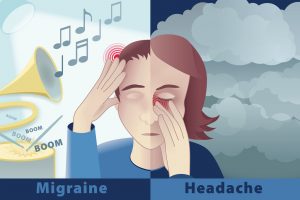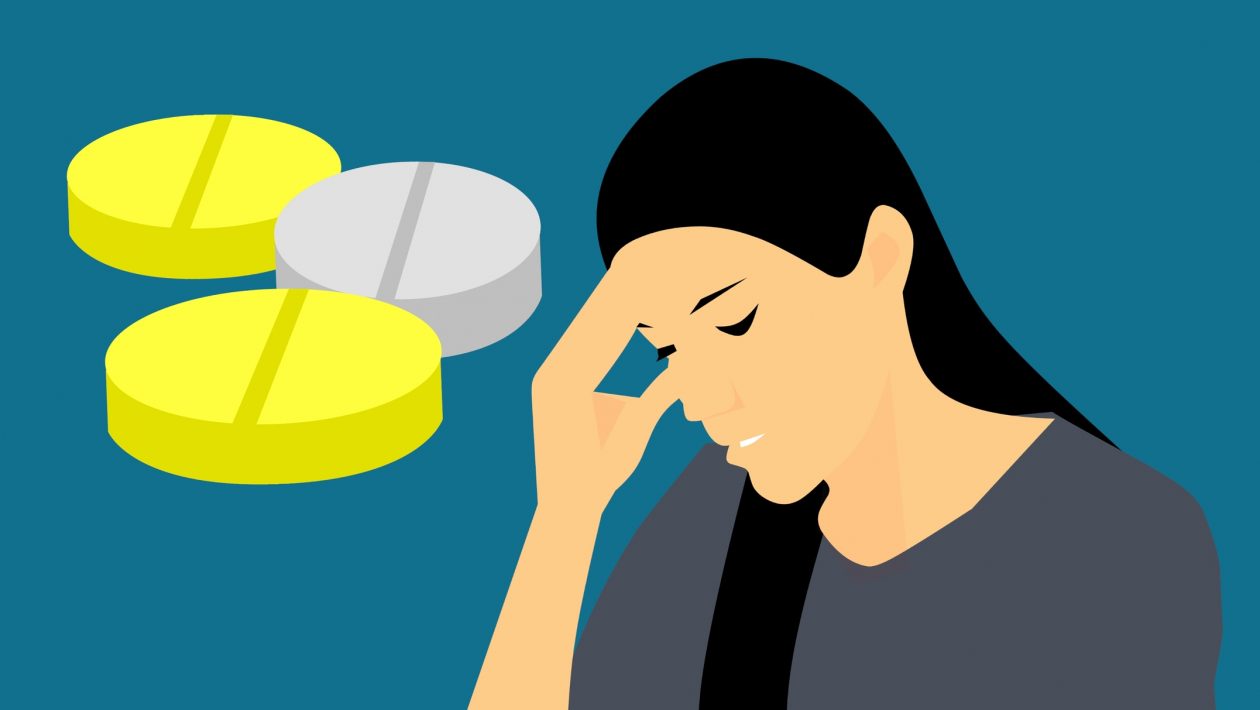There are multiple health problems which we often ignore, expecting it to be a minor issue. One such issue which most of us ignore thinking is it a minor condition is a headache. You might be having a headache but you don’t pay much attention to it every time. As a result, the headache worsens and you pop in a non-prescribed pill. Have you ever thought that your repetitive headache could be a migraine? Well, you might not know yet but a headache is one of the migraine symptoms. If you don’t know what migraine is, it is time you do!
Migraine meaning
A migraine is a form of headache that affects a human body along with sensitivity towards light, vomiting, and nausea. It is a neurological condition which can last from 4 hours to 3 days. In the US, the AMF or the American Migraine Foundation researched about migraine. The results were pretty astonishing as almost 36 million people are affected by it. The data collected shows that women are more affected by migraines when compared to men. A general age group was also derived through the survey which showed that it affected people from the age of 10 to 40.
Migraine is said to be a hereditary health condition as well. For instance, if your parental grandfather suffered from migraines, there are high chances that you may get affected by it too. It can pass down from grandparents to parents and children. Migraine can be easily mistaken with common headache reasons and that is why most of the migraine cases go unrecorded. The diagnosis process includes clinical testing, verifying symptoms, and detecting the phenomenon.
Effects of Migraine Pain
As described by the people suffering from migraines, the pain has different forms. Some patients experience a pulsating pain, while some experience pounding, throbbing, debilitating and perforating kinds of pain. In some cases, patients have felt a steady and severely dull headache as well. It often starts as a regular headache but if kept untreated, things could aggravate to a much worse level. Migraine pain often affects one side of the head in the forehead area, but in some cases, it can occur on both sides too.

Table of Contents
Types of Migraine Headaches
Coming down to the types of migraine headaches, the most common one is the ones without any aura. Although the migraine symptoms in all the cases are the same there are different types of headaches. The migraine headache with aura is known as the classic migraine. Aura is the signal which you might receive before the pain starts. Usually, the aura starts an hour before the actual migraine pain and can last up to 15 to 20 minutes. There are some visual auras which include:
- Blurry vision
- Jagged or wavy lines
- Bright lights or flashing dots
- Temporary loss of vision
- Blind spots
Apart from these, there are other auras that can affect the senses of the patient. These auras can cause a minute change in your sensation like hearing, taste, feeling, and more. Some of the rarest migraine conditions have such auras. Here we have briefed about these rare migraine conditions as well.
1. Hemiplegic Migraine
Under this condition, you will experience a short time paralysis or Hemiplegia in one side of your body. Along with this, you might feel temporary dizziness, numbness and vision problems. Besides, these are also the symptoms of stroke so it is tough to distinguish both the conditions. Doctors recommend getting emergency help whenever you or anyone known to you experiences these symptoms.
2. Ophthalmic Migraine
This condition has different symptoms. These symptoms are dull ache behind your eye, partial or complete vision loss in one eye for a short period of time, and more. if you experience any of these symptoms, immediately ask for medical help.
3. Migraine with Brainstem Aura
Loss of balance, dizziness, confusion, mild headache is some of the symptoms prior to the actual headache. Under this condition, the pain affects the back of the head. Some of the other symptoms related to this condition are trouble speaking, vomiting and ears ringing. This form of migraine is common in teenage and adult women as it is strongly related to hormonal change.
4. Migrainosus
Migrainosus is a rare migraine condition that can last for more than 72 hours. Nausea and the pain are so intense that you just need to rush to the hospital. This is caused due to some medication or as a part of withdrawal syndrome.
5. Ophthalmoplegic Migraine
Paralysis of the eye muscles and pain around the eye are the common symptoms of this type of migraine headache. This condition is an emergency health condition and requires immediate doctor’s assistance. The pain can create pressure on the nerves of the eye. There are other symptoms as well which include double vision, droopy eyelids, and so on.
Migraine Facts
- People who suffer from migraines can easily detect the migraine symptoms and the factors leading to it. The most common factors are allergies, stress, and anxiety.
- Migraine patients get a warning before the pain starts and that is as a signal.
- If you can detect the commencement of the condition, you can stop it from affecting you or anyone you know by acting upon it.
- OTC or over the counter medication such as pain reliefs can reduce the pain. Further, if you can avail of the specific medication, it can help you escape the headache as well.
- Migraine patients who are prone to severe attacks prevent it by keeping the required medications along with them all the time.

Migraine Symptoms
The symptoms of migraine might affect you a couple of days before the actual attack. This time period is known as the prodrome stage of a migraine attack. The symptoms you will experience during this stage are:
- Excessive craving for food
- Stiffness in the neck area
- Low energy
- Fatigue
- Depression
- Frequent yawning
- Irritability
- Stress
- Hyperactivity
In the cases where the patient suffers from migraine with aura, the symptoms occur after the prodrome stage. In the aura migraine case, you will experience vision problems, movement issues, speech problems, and sensation problems. Some of the examples of these problems are listed below:
- Improper speech or difficulty while speaking
- Temporary vision loss
- Tingling or prickly sensation in the legs, face, and arms
- Seeing bright spots, irregular shapes, and flashlights
Next comes the actual attack phase where you will experience a different set of symptoms. At this stage, things have already aggravated to a much severe condition. Now is when the migraine pain starts to affect you. This pain can occur during the aura time period as well. The symptoms of the migraine attack last up to a day or two. Although the symptoms vary from person to person the effects are pretty similar. The symptoms of the attack are mentioned below.
- Nausea
- Vomiting
- Dizziness
- High sensitivity towards sound and light
- Various forms of head pain like pulsating, throbbing, pounding, and more
- The pain of migraine occurs in only one part of the head, like the left side or right side. In some cases, it occurs in the back of the head or in the forehead too.
Once the attack is over, you will experience the postdrome phase. This phase has a distinct effect on the feelings and mood of the person affected by migraines. Feelings can be as different as feeling happy euphoric or feeling pathetic and fatigued. You might feel a constant mild headache after the attack is over. The intensity of the attack and the length, both vary in every individual. At times, you might not be affected by the aura phase or the prodrome phase.
Causes of Migraine Headaches
The exact cause of migraine is not known to a lot of us but the migraine symptoms are. Depending on these symptoms doctors tend to treat their patients too. It is stated in a study that migraine is caused due to the relative changes in the brain as well as the genes of the individual. As mentioned earlier, migraines can be due to hereditary. You can also inherit the symptoms of migraines from any of your family members such as grandparents or parents as well.
A group of scientists researched the cause of migraines. As a result, it was found that this condition can be caused due to the change in the pattern of blood flow in the brain. Some people think it is a brain condition that comes from the time of birth. Well, this has very little chances to be true but isn’t verified yet.

The process of migraine pain commences when an overactive nerve cell sends a signal to the trigeminal nerve to activate. Trigeminal nerves send sensation to the face and head. When this nerve is activated, some of the chemicals are released in the brain. These chemicals are CGRP or Calcitonin Gene-Related Peptide and serotonin. CGRP leads to the swelling of the blood vessels in the brain. In addition to this, neurotransmitters are released which causes pain and inflammation in the head. Even though a definite cause hasn’t been verified by scientists and doctors, but there are some factors that contribute to the cause.
- Traveling
- Dehydration
- Smoking
- Loud noises
- Alcohol drinking habits
- Skipping meals
- Unusual or foul smell
- Intense physical workout
- Selective foods
- Improper sleeping habits
- Oral contraceptives and nitroglycerin
- Hormonal changes in women, like progesterone and estrogen instability during pregnancy, menstruation, and menopause
- Stress
- Anxiety
- Barometric pressure fluctuation
- Severe hot and cold weather changes
- Bright lights
If you experience any of the migraine symptoms then you might be affected by the condition. The best way to detect it is by consulting a doctor and opting for clinical tests.
Treatment for Migraine
Treating migraine is not an easy task as it is aimed towards eliminating the attacks completely. You can opt for some of the changes in your daily lifestyle to eliminate migraine headaches completely. These changes are:
- Reduce stress
- Reduce anxiety
- Get rid of depression
- Avoid foods which cause health issues
- Avoid smoking
- Eliminate the use of alcohol
- Consume a minimum of 8 to 10 glasses of water daily
- Exercise daily
- Develop proper sleeping habits
- Follow a proper and healthy diet
If these aren’t enough to help you with the migraine conditions then you must consult a doctor. You can also opt for certain migraine medications but only after your doctor recommends it to you. Besides, there is an option of surgery which is for severe migraine problems.
Medications to Eliminate Migraine Symptoms
You can control the migraine through medication courses given by doctors. You need to follow it up as prescribed else it might not resolve the issue. There are some specific medications for migraine as well as some painkillers which can help you get rid of the pain. These painkillers are available in every pharmacy. You can get them over the counter on placing the prescription of the doctor. The painkillers are:
- Ibuprofen
- Naproxen
- Acetaminophen
- Aspirin with Acetaminophen and Caffeine

How to Prevent Migraines?
The best way to prevent migraines is by detecting the symptoms and eliminating the possible causes of it. Further, you can consume medications prescribed by your doctor for avoiding or eliminating the condition. Also, you need to keep a record of the symptoms and causes which trigger the headache. This, in turn, will help you to avoid the symptoms in the future.
Stress, anxiety, and depression are some of the root causes of a lot of health issues. It also leads to migraine headaches as well. You need to avoid stress, anxiety, and depression to stay away from migraine pain. At any point, if you experience symptoms of migraine, straightaway consult your doctor for help. It will be a huge mistake if you allow the condition to aggravate.
Change in lifestyle can also help you avoid the symptoms of migraines and lead a healthy life. All these factors are only effective when you are aware of your health condition. If you don’t take proper care of your health, then you might be the next person visiting a doctor for migraine headaches. Stay fit and take good care of your health.





